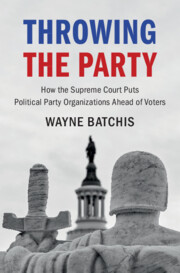Book contents
- Throwing the Party
- Cambridge Studies on Civil Rights and Civil Liberties
- Throwing the Party
- Copyright page
- Contents
- Preface
- Acknowledgments
- Part I Foundations
- 1 Introduction
- 2 The Supreme Court’s Approach to Political Parties
- 3 The Association versus the Individual
- Part II Party Primaries
- Part III The Party, the Court, and Campaign Finance Law
- Part IV Passé Equal Protection and a Way Forward
- Index
1 - Introduction
from Part I - Foundations
Published online by Cambridge University Press: 16 June 2022
- Throwing the Party
- Cambridge Studies on Civil Rights and Civil Liberties
- Throwing the Party
- Copyright page
- Contents
- Preface
- Acknowledgments
- Part I Foundations
- 1 Introduction
- 2 The Supreme Court’s Approach to Political Parties
- 3 The Association versus the Individual
- Part II Party Primaries
- Part III The Party, the Court, and Campaign Finance Law
- Part IV Passé Equal Protection and a Way Forward
- Index
Summary
Who makes the rules? One of the first lessons children must confront is that the rules are hard to change while the game is being played – especially by the players themselves. It is tempting to declare that the Free Parking space on the Monopoly board garners a $500 bonus when one is the first player to land on that corner real estate. This is, after all, an informal rule that is customary among some players of Monopoly. Yet, if it is not clearly decided in advance that the game will be played with this rule in place, allowing such ad hoc rulemaking by a rulemaker who is also a player, and whose conflict of interest is all-too-apparent, would risk a precarious slide down a slippery slope. The game itself may collapse as players in turn seek to institute new self-serving rules, conflicts ignite, and general trust in the game rapidly spirals downward. Fortunately, for families with avid board game players, this lesson is quickly learned: If we are going to add to the rulebook, we have to do it before the game begins. There is an opportunity to learn from every board game controversy, because board games end. And they begin anew.
- Type
- Chapter
- Information
- Throwing the PartyHow the Supreme Court Puts Political Party Organizations Ahead of Voters, pp. 3 - 16Publisher: Cambridge University PressPrint publication year: 2022

